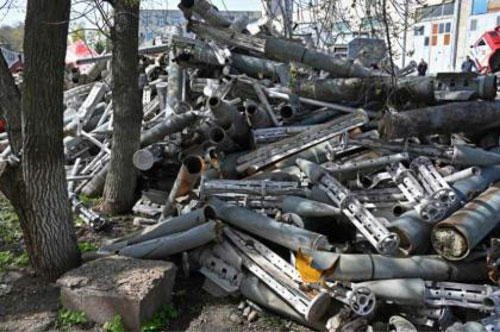Russia said Wednesday it had destroyed a large quantity of Western-supplied weapons in Ukraine, while halting gas supplies to EU and NATO mem-bers Poland and Bulgaria in a move Brussels branded attempted blackmail.
With the conflict that has claimed thousands of lives entering its third month, Ukraine conceded Russian forces had pushed deeper into the country’s east and captured several villages, as Moscow inten-sifies a renewed offensive to take control of Donbas.
Russia’s defence ministry said its forces had de-stroyed the “large batch” of weapons and ammunition supplied by the United States and European countries using long-range missile strikes on southeastern Ukraine.
They targeted hangers at an aluminium plant near the Ukrainian city of Zaporizhzhia with “high-precision long-range sea-based Kalibr missiles”, the ministry said, without specifying the weapons de-stroyed.
It comes a day after a summit in Germany of 40 Western allies to discuss arms supplies to Ukraine where Washington pledged to move “heaven and earth” to enable Kyiv to emerge victorious.
Tensions are also rising in a breakaway region of Moldova bordering southwestern Ukraine, where the interior ministry said that shots had been fired at a village housing a Russian arms depot after drones flew over from Ukraine.
The unrecognised region has reported a series of explosions in recent days that it called “terrorist attacks”, leading Kyiv to accuse Moscow of seeking to expand the war further into Europe.
Russia’s energy giant Gazprom said it had stopped all gas supplies to Poland and highly de-pendent Bulgaria, after not receiving payment in rubles from the two EU and NATO members.
President Vladimir Putin last month warned Moscow will only accept payment for deliveries in its national currency, with buyers required to set up ruble accounts or have their taps turned off.
The Kremlin is grappling with the fallout from numerous rounds of European and US sanctions that have targeted various sectors and left it unable to utilise foreign currency, including its own reserves.
But the war has exposed the extent of the Euro-pean Union’s dependence on Russian gas, which accounts for 45 percent of its gas imports.
The 27-member bloc said it was “prepared” for the stoppage and was planning a “coordinated” re-sponse, labelling it “another attempt by Russia to blackmail us with gas”.
“Europeans can trust that we stand united and in solidarity with the member states impacted,” Euro-pean Commission chief Ursula von der Leyen said on Twitter.
Bulgaria and Poland have both said they will be able to make up the shortfall from other sources. The targeting of Western-supplied arms came as the US and Europe appear to be heeding Ukrainian President Volodymyr Zelensky’s call for heavier firepower to push back the Russian advance now focused on Donbas.
Western allies remain wary of being drawn into an outright war with Russia, but have stepped up their support as Ukraine has maintained its fierce resistance.
“Ukraine clearly believes that it can win and so does everyone here,” US Defence Secretary Lloyd Austin said at the summit on Tuesday, where Ger-many announced it would send anti-aircraft tanks in a sharp U-turn on its much-criticised cautious stance.
Britain will on Wednesday urge Kyiv’s allies to “ramp up” military production including tanks and planes to help Ukraine, with Foreign Secretary Liz Truss set to call for a “new approach” to confront Russian President Vladimir Putin.
“We must be prepared for the long haul and double down on our support for Ukraine,” she is set to say, according to pre-released remarks.
“Heavy weapons, tanks, aeroplanes — digging deep into our inventories, ramping up production. We need to do all of this,” Truss will add.
She will also urge Europe to cut off Russian en-ergy imports “once and for all” — a move that would deprive Moscow of a key source of leverage over its dependent western neighbours.
Fighting continues to rage across Ukraine’s east, Kyiv’s defence ministry said, as it confirmed Russian forces had seized several villages as part of Moscow’s offensive to take control of the Donbas region, which Russia has vowed to “liberate”.
The ministry said the villages of Velyka Komy-shuvakha and Zavody in the northeastern Kharkiv region and Zarichne and Novotoshkivske in the Do-netsk region had fallen.
Russia aims to create a land border between ter-ritory held by pro-Russian separatists in parts of the Donbas and the Russian-annexed Black Sea penin-sula of Crimea.
Mykhaylo Podolyak, a Ukraine presidential aide, accused Moscow of grander ambitions and wanting to “destabilise” the Transnistrian region of Moldova, at the western end of the Black Sea, amid growing tensions there.
“If Ukraine falls, tomorrow Russian troops will be at Chisinau’s gates,” Podolyak said, referring to Moldova’s capital.
A Kremlin commander last week alleged Russian speakers in Transnistria, occupied by Moscow’s forces for decades, were being oppressed.
It raised similar fears to justify in part launching its bloody invasion of Ukraine on February 24.
Before the latest claims on Wednesday of an in-cident at a Russian arms depot there, explosions had hit the state security ministry, a radio tower and military unit.
The United States has echoed Kyiv’s concerns — though stopped short of backing its contention that Russia was responsible.
“We fully support Moldova’s territorial integrity and sovereignty,” State Department spokesman Ned Price told reporters.
Meanwhile, in a meeting with Putin Tuesday, UN Secretary-General Antonio Guterres called for aid and evacuation corridors in war-torn Ukraine. He also urged an independent investigation into “possible war crimes” in Ukraine.
The UN’s refugee agency said it now expects more than eight million Ukrainians to eventually flee their country, with nearly 5.3 million already out, and that $1.85 billion would be needed to host them in neighbouring countries.—AFP










